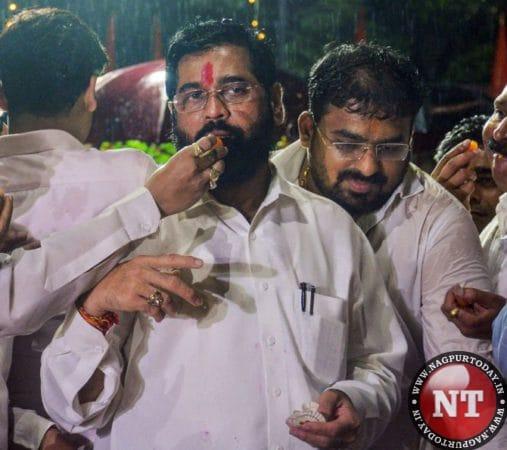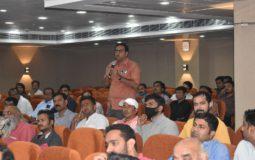
The ruling Eknath Shinde camp in Maharashtra told the Supreme Court on Tuesday that the rival side led by Uddhav Thackeray wanted the speaker of the state assembly to “usurp” the powers of the Election Commission when the ultimate test of majority in a democracy — the floor test — was ordered by the governor during the 2022 political crisis.
Senior advocate Neeraj Kishan Kaul, appearing for the Shinde bloc of the erstwhile undivided Shiv Sena, told a five-judge bench headed by Chief Justice DY Chandrachud that a nine-judge Constitution bench of the apex court had in its 1994 verdict said a floor test is the litmus test of democracy and a chief minister cannot shy away from it.
Kaul told the bench, also comprising Justices MR Shah, Krishna Murari, Hima Kohli and PS Narasimha, that if the chief minister shirks the responsibility of facing the floor test, it means he does not enjoy the majority of the House.
Kaul said it is a settled law that the speaker of the House has to take a prima facie view of whether a split had occurred in a political party based on the material placed before him and he cannot embark on a roving inquiry.
Justice Narasimha told Kaul, “Our difficulty is that you are formulating a principle of prima facie view. Difference between a split and rival faction is very thin. It is very easy for a Speaker to say prima facie it is a case of split or not.
“But we are on the question as to what should be the contours for the Speaker to take a prima facie view. It is a slippery ground because Speaker is asked to take a prima facie view based on the material placed before him like signatures of MLAs and others. How much material should be there to enable a Speaker to take a prima facie view?” Justice Narasimha said.
A political party and the legislative party are conjoined and interdependent and these cannot be segregated, Kaul submitted while apparently referring to the Thackeray faction’s contention earlier that the Shiv Sena had not split because of the revolt by a section of the party led by Shinde.
“Dissent is the hallmark of democracy. Argument from other side is that we (Eknath Shinde faction) represent legislative party and not original political party is a fallacy. This court has said that Speaker will not embark on an independent inquiry on whether there is split in the party, dehors (without) disqualification. With respect to disqualification, only a prima facie view has to be taken by the speaker but they (Uddhav faction) are asking the speaker to usurp what he doesn’t have,” Kaul said.
“They want the speaker to embark on jurisdiction which is of Election Commission and they want governor to exercise jurisdiction which the Election Commission has. Governor cannot indulge in head count sitting in Raj Bhavan but can ask for proving majority on the floor of the House,” Kaul argued.
The governor has to take a prima facie view based on cogent material before him like withdrawal of support to the ruling party, and ask for a floor test as early as possible because it is the “only litmus test in democracy”, he said.
Kaul added the argument of the Uddhav Thackeray faction is that the June 27 last year order of the court toppled the state government but the fact is that this court intervened only after the speaker gave two days to the Shinde group to reply to the show cause notices, that too on weekdays.
The Thackeray faction had earlier told the top court the formation of a new government under Shinde was the “direct and inevitable result” of two orders of the apex court dated June 27, 2022 (restraining the speaker from deciding the pending disqualification petitions) and June 29, 2022, (allowing the trust vote to be held). It had said the two orders “disturbed the co-equal and mutual balance” between judicial and legislative organs of the State.
Senior advocate Mahesh Jethmalani, also appearing for the Shinde faction, said there was simmering discontent and division among not only the party cadres but also its legislators which was evident from the statements made by different MLAs from time to time since the inception of the post-poll alliance called Maha Vikas Aghadi (MVA).
“The irreconcilable differences arose on June 21 last year over longstanding ideological divide with coalition partners — Congress and NCP — and the first salvo was fired by Uddhav Thackeray faction after they removed Eknath Shinde as leader of legislative party and a whip was issued to MLAs that party meeting is scheduled to be held at the house of then chief minister Uddhav Thackeray. After that there was no possibility of reconciliation as party forums became irrelevant,” he said.
Senior advocate Maninder Singh, also appearing for the Shinde faction, said when splinter groups or rival sections of a political party raise a claim about being “the recognised political party”, the situation squarely falls within the exclusive jurisdiction of the Election Commission.
The hearing remained inconclusive and will continue on Wednesday.
On March 2, the Shinde faction had told the top court that the pleas related to the June 2022 Maharashtra political crisis fell within the realm of politics and judiciary cannot be asked to adjudicate the issue.
A political crisis had erupted in Maharashtra after an open revolt in the Shiv Sena, and on June 29, 2022, the apex court refused to stay the Maharashtra governor’s direction to the 31-month-old MVA government to take a floor test in the assembly to prove its majority.
Sensing defeat, Thackeray had resigned, paving the way for a government led by Shinde.
On August 23, 2022, a three-judge bench of the top court headed by then chief justice N V Ramana had formulated several questions of law and referred to the five-judge bench petitions filed by the two Sena factions which raised several constitutional questions related to defection, merger and disqualification.














